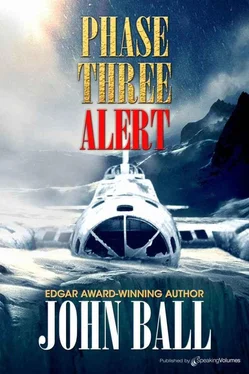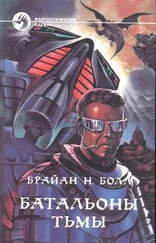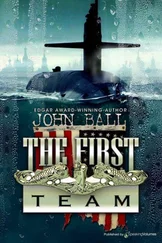“Then the crew of the Penguin will go on board and start the engines. The Det. Four Jollies will fire up, take off, and hover over each side of the airstrip, far enough back so that they don’t create too much air disturbance over the runway. Slowly the Penguin will taxi down the ramp while the band plays again.”
“Not just any piece of music,” Collins interjected. “The Passionate Penguin March. Tony can compose it for us; I know him and he will.”
“The Passionate Penguin March,” Ferguson repeated. “A good rousing tune with a cut from the Air Force song sandwiched somewhere in the middle. Meanwhile the B-17 reaches the end of the runway and does the checklists. Then everything stops, the band is quiet, the choppers hover in position. Presently the engines on the B-17 pick up in tempo, the plane begins to roll forward.”
Captain Tilton understood perfectly. “The only music the sound of her engines,” he continued in Ferguson’s place. “Then, directly in front of the grandstand, if we had one, she lifts her nose and takes off once more — the miracle accomplished, the prisoner of the ice cap freed, and a damn good airplane back in operation once more.”
“We can use her to give multiengine flight checks,” the Dane said. He was an advanced flight instructor in his own country.
“We can run up to visit the guys at Alert, if we can get permission to land,” Feinberg contributed. “We can go weekending down in Sondrestrom; they have some women there and there are dances.”
“She has over a four-thousand-mile range,” Andy Holcomb chimed in. “She can easily go to Iceland, down to McGuire, almost anyplace.”
“The gas will cost,” the Dane declared, “but we have free hangar space, free maintenance, and no crew costs. We can fly her for peanuts.”
“How many will she carry?” Tilton asked of Andy Holcomb.
“Her original crew would be ten, so presumably she could haul twenty warm bodies with no trouble at all. The only limiting factors would be fuselage dimensions and baggage space. We ought to be able to convert the bomb bay into a cargo hold.”
“After we get the landing gear fixed,” Sergeant Stovers cautioned.
The mood had changed; somehow it was assumed by everyone present that the crushing problem would be resolved one way or another. Ferguson went back to the serving line to get some additional dessert.
* * *
That afternoon the C-130 went out to Camp Century and delivered a load. It was all very brisk and businesslike, with the ice cap landing no problem at all. While out there Ferguson and Corbin made a detailed inspection on foot of the landing area and found it to be in good condition for further operations. For once the pilot did not need to concern himself that someone would question why he was there and what he was doing. This was his officially assigned job and he was beyond reproach.
When he returned to Thule, Ferguson found Sergeant Feinberg awaiting him. “It occurred to me that we might have a cup of coffee together if you would like, sir,” the big man declared.
“By all means,” Ferguson replied. He experienced a little thrill of satisfaction. He felt like a hard-pressed quarterback who has just seen a long desperation pass taken on the run by his tight end. Obviously Perry Feinberg had thought of something.
They sat down together in a corner of the small passenger terminal. “Sir,” Feinberg began, “I may have an idea concerning the landing-gear problem. It will require a little maneuvering and a flexibility of outlook concerning the regulations.”
“I’ve bent them out of shape already, Sergeant, so one more time shouldn’t matter.”
“Hopefully not, but this time it may be necessary to get into another command area. Before undertaking this, I wanted to ask you, in general terms, if you’re willing to take a reasonable chance.”
“How about yourself?”
Feinberg beamed confidence. “The risk can be minimized; master sergeants do not snitch on one another. But you might be exposed to some criticism if I can’t keep the lid on.”
“Tell me one thing,” Ferguson said. “What are the chances of success?”
Feinberg flexed his shoulder muscles while he framed his reply. “Not too bad, I would say, sir, if everything goes as planned.”
“You think we can get the part?”
“Yes, I do.”
“How soon?”
“Quite soon, if what I have in mind works.”
“Do you want to tell me any more about it?”
“No, sir, because if it comes down to the wire, you will be able to state that you had no personal knowledge of what was going on. And obviously you couldn’t have authorized it if you didn’t know anything about it.”
Ferguson thought. “I see. Boiling it down, you’re giving me an out if I need it.”
“Precisely, sir. One more thing: I’ll have to have that picture of Monica Lee. I trust that it is expendable in a good cause.”
“Only for the sake of the Penguin ,” Ferguson declared.
“Obviously, that is what I have in mind.”
“Then take it.”
“Thank you. On a slightly different matter, sir — you will recall the Danish artist we have here, Viggo Skov?”
“Yes. The colonel thought it would be nice if he would paint a picture of the Penguin in flight — to hang in the NCO Club along with a prop.”
“The picture, sir, is well underway despite the change in plans. Viggo has now consented to repaint the design on the Penguin’s nose for us, but a delicate question has arisen. The original is somewhat graphic — you may have noticed.”
“Frankly, no, Perry. It’s almost obliterated.”
“But it can still be made out. Viggo has suggested that he can redo the design with a small modification to make it more acceptable to the middle-class masses, or he can restore it to its original glory, exactly as was — in which case, someone should be standing in front of the nose if any pictures are taken for publication.”
“Sergeant Feinberg,” Ferguson said formally. “We have undertaken collectively to restore The Passionate Penguin to her former proud status as she was. I will not kowtow to the Watch and Ward Society. Furthermore, times have changed — as witness Miss Lee’s picture.”
“Sir, my compliments,” the chief master sergeant said “Allow me to inquire if you have an opening in your crew.”
“Just get the landing-gear fitting; that’s an assignment worthy of your genius.”
Feinberg stood up and became immense. “It will be done, sir,” he promised.
* * *
The road to J Site was displaying its usual spring roughness after the long deep freeze of winter. As Sergeant Feinberg drove the vehicle that he had successfully scrounged for his own use, he took in every aspect of the short but spectacular drive.
Not far from the roadway the base of the ice cap took over command of the terrain. From that point it rose onward and upward toward the incredibly blue sky of the High Arctic. The most extraordinary sight from the roadway was not the beginning of the ice cap, but the four enormous radar antennae of J Site itself. When the region had first been surveyed, the promontory on which they now stood had been designated J Site as a convenient means of reference. After the vast BMEWS installation had been built, the name had stuck. It was J Site to everyone at Thule and was seldom referred to in any other way.
The antennae themselves were each much larger than a football field. They were permanently fixed in position at varying angles to each other, but for practical purposes all of them were aimed toward the most likely source of a possible missile attack against the United States — the Soviet Union. Twenty-four hours of every day, every day of every year, the powerful beams from BMEWS swept the sky and the space far above the atmosphere in a continuing, unbroken watchfulness. Seen from the outside BMEWS was static; a series of covered passageways led from one building to another, offering no protection from the temperatures, but at least keeping most of the frequent snowstorms from interfering with local traffic. There was also a huge radome that housed an eighty-five-foot dish able to turn with high precision and considerable speed toward any target above the horizon, or in outer space. The need to maintain unceasing vigilance was the reason for the existence of J Site and for the presence at that extremely remote location of a staff of several hundred men and two women who worked in unbroken shifts to guard the ramparts of Canada and the United States. The support of J Site was the reason for the existence of Thule Air Base and gave it its principal mission.
Читать дальше












